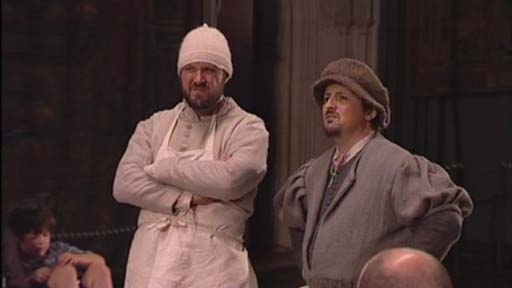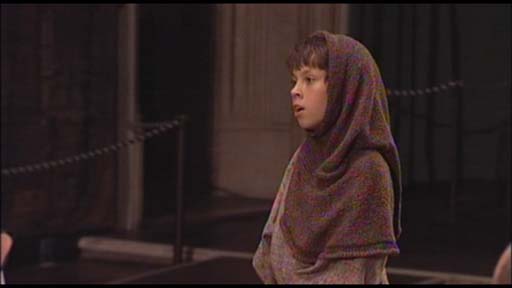Humanism, Education and Political Debate in Henry VIII’s England
Professor Greg Walker

Ed Woodall as The Windmiller and
Peter Kenny as The Watermiller in debate
There is a real delight in the forms and protocols of debate and argument evident in Heywood’s The Play of the Weather. It is there most obviously in scenes such as the formal debates between the two Millers and the Laundress and the Gentlewoman over which of their respective vocations is superior to the other (debates which shift deftly between questions of morality, philosophy and social utility, while deploying a great deal of wit). But it is also there throughout the play as a whole. Each of the characters comes to court to ‘put the case’ for the favouring of their particular vocation over all the others, and so for the perfect weather to suit their occupation and lifestyle. And it is evident in the task which the play sets for Jupiter, and which is memorably summed up for us by Merry Report at the end of the play. How is the king of the gods going to reconcile all these mutually contradictory claims and still maintain a stable and harmonious commonwealth? The structure of the play is thus one extended intellectual puzzle in various entertaining parts. And the final scene recaps the terms of that puzzle for our enjoyment, making sure we don’t miss any of the intellectual nuances of the problem that the god is presented with. Each of the suitors’ pleas is summarised for us in Merry Report’s tour de force final monologue, and each of their cases is then commented on by Jupiter, before he resolves the puzzle with a simple piece of intellectual dexterity: each of them shall have what they deserve, but only for some of the time. Everything shall stay as it was, but everyone will be happy. The solution is thus as much a triumph of rhetoric and reasoning as it is of political management. In this respect the interlude definitively identifies itself as a product of humanist education as well as of Henrician politics and courtly culture.
Writers and scholars such as Heywood, who had been educated in the humanist grammar schools or their scholastic predecessors, in the Inns of Court or the Universities, and the many boys and few girls who enjoyed a private humanist education in aristocratic households, were alike trained in the disciplines of rhetorical argument and debate. The curriculum in each of these institutions was based upon medieval educational principles that made the Trivium of grammar, rhetoric and logic the bedrock of the learning process, the essential intellectual apparatus of the complete human being. Students of all kinds sharpened their wits and learned their trades in rhetorical exercises and mock disputations centred on ‘the putting of cases’ – the consideration of universal principles by analogy to specific examples, and the arguing on either side (in utramque partem) of hypothetical theses: ‘What if...?’, ‘Suppose that…’.1

Gabriel Thompson as The Boy
In the grammar schools boys learned by memorising, repeating, translating and finally imitating the examples of the best classical authors, discovering how to write and speak elegantly and to argue their way through carefully selected dilemmas and situations. Erasmus encouraged tutors regularly to set their pupils ‘a memorable historical story’ to consider and debate with their fellows. Among the examples that he suggested were the claim that ‘the headlong heat of Marcellus overthrew the Roman cause, the prudent delaying of Fabius restored it’. Consideration of this case would, he asserted, not only allow the boys to exercise their skills in eloquence and logic, but also teach the moral and political lesson that ‘too precipitate plans usually turn out unhappily’. Alternatively, pupils might be asked to criticise the tyrant Julius Caesar or praise the good counsellor Socrates in order both to practice the set forms of oration and to internalise a healthy contempt for despotism and a due regard for truth2. The examples of wisdom or folly that they encountered in their reading, should be noted down in specially prepared notebooks for commonplaces, divided under separated headings, to provide raw material to be recycled in future exercises or conversations. As Erasmus observed in his dialogue on schoolroom practice, The Right Way of Speaking Latin and Greek (1528), ‘the sayings of famous men, good pithy aphorisms, proverbs, bon mots, all these can serve the purpose [of teaching vocabulary], and moreover, provide extremely useful ammunition for the future speaker on all sorts of occasions’(402). ‘The whole past’, as Cicero put it, was thus ‘a storehouse of examples and precedents’ for contemporary use (61).
Tom Betteridge and Eleanor Rycroft discussing The Boy
What was common practice in the established schools was also followed by private tutors in royal palaces and the households of the aristocracy. Juan Luis Vives advocated a similar regime when he drew up a syllabus for Princess Mary, daughter of Henry VIII and Katherine of Aragon. She was to spend her early years in the memorisation, repetition, and imitation of classical examples that taught morality as well as language skills. ‘The verses which are assigned for imitation’, Vives wrote, ‘let them contain some grave little sentiment, which it will profit to have learned’. From an early age the Princess was intended to learn both the portability and the usefulness of the anecdotes and sententiae learned from her books, and to become proficient in passing on such nuggets of instruction to her fellows: ‘she will be delighted, meantime with little tales which teach life, which she herself can tell to others’. Vives cited among others, the stories of Joseph in the Old Testament, Lucrece in Livy, and that archetype of virtuous womanhood, patient Grisselda. In the syllabus he designed in 1523 for Charles Mountjoy, the son of Henry’s schoolfellow William, Lord Mountjoy, Vives also recommended the keeping of a commonplace book of stories and sayings on ‘subjects of daily converse’ which the boy was to memorise and refer to daily in his thought and conversation (185-9,194)3. Such material would form the foundations of that part of logic formally termed ‘Invention’ which Thomas Wilson described as the faculty ‘whereby we may find arguments, and reasons, mete to prove every matter where upon question may rise. This part is the store house of places wherein arguments rest’. Sir Thomas Elyot in his Book Named the Governor, argued that from the age of fourteen onwards the children of the aristocracy should be exercised in ‘the art of the orator’, using Quintilian as the basis for a grounding in rhetoric, ‘principally which concerneth persuasion; for as much as it is most apt for consultation’. For those pupils who did not desire to become ‘an exquisite orator’, Erasmus’s Copia might be used instead. Either way, the ability to speak well and to turn old stories and maxims to contemporary use across the whole gamut of social situations, from the public audience at court to a private conversation with friends, was seen as the crucial attribute of the well-rounded gentleman. Primarily, however, the fruits of this training were political, for, as Elyot, declared, ‘the utility that a noble man shall have by reading these orators [Isocrates, Demosthenes, Cicero, Quintilian] is that, when he shall hap to reason in counsel, or shall speak in a great audience, or to strange ambassadors of great princes, he shall not be constrained to speak words sudden, and disordered, but should bestow them aptly, and in their places’ (Eiv(v)-Ev)). Rhetoric, like wisdom, was learned in order to be applied, chiefly in the exercise of political action for the betterment of the commonweal. And the forum for that action was the royal court.
Notes:
- See Joel T. Altman, The Tudor Play of Mind (University of California Press, 1978).
- See, for example, Nicholas Orme, Education and Society in Medieval and Renaissance England (London: The Hambledon Press, 1989).
- Vives cited in T.W. Baldwin, William Shakspere’s Small Latine, I (University of Illinois Press, 1944).
References:
Taken From Greg Walker, Writing Under Tyranny (Oxford, 2005) pp. 16-20.
Cicero, On The Ideal Orator, edited and translated by James M. May and Jakob Wisse (Oxford, OUP, 2001), p. 61.
Thomas Elyot, The Boke Named the Governor (London, 1531).
Erasmus, The Right Way of Speaking Latin and Greek, edit. and trans. Maurice Pope, in The Collected Works of Erasmus, University of Toronto Press, 1985.











